|
President Park Guen-hye of the Republic of Korea graced the opening of ITU's 19th Plenipotentiary Conference (PP-14) with her presence. The three-week conference (20 October-7 November) got off to a dynamic start at BEXCO Center in the coastal city of Busan. The opening ceremony was addressed by the Republic of Korea's Minister for Science, ICT and Future Planning, Yanghee Choi; the Mayor of Busan City, Byung-soo Suh; ITU Secretary-General Dr Hamadoun I. Touré; United Nations Secretary-General Ban Ki-moon via a video message; and President Park (in that order).
In his opening remarks, Dr Touré told delegates that they were in Busan to shape the future. "We are not just talking about the future of ITU, but the future of the ICT sector – which now cuts across every business sector worldwide, and reaches into the lives of almost everyone on the planet. I am counting on membership to be bold, to be visionary, and to dream – to dream big!," he stated.
A high-tech video clip, a commemorative stamp to mark PP-14, and a special performance of traditional Korean dance by the National Dance Company were all part of the impressive opening programme. The afternoon saw the conference agree on its structure, elect its presiding officers, an appeal by Dr Touré to step up efforts to address the Ebola crisis, and the beginning of policy statements from high-ranking officials, for the most part ministers from ITU Member States. Following is a summary of Day 1 of the conference.
President Park Guen-hye calls on the conference to address the global ICT gap
In her commemorative speech, President Park stated that telecommunications and ICT have been catalytic in the rapid development of the Internet and mobile communications. This, she said, has "brought about great changes and made it possible to share knowledge in all areas of human lives including politics, the economy, society and culture". She added that "with the Internet of Things, interconnectedness and Big Data analytics are precipitating the convergence of technology and industries."
Outlining this changing environment, President Park observed that "We thus have reached an inflection point in the hyper-connected digital revolution – a revolution defined by 'increased connection, smarter connection, and faster connection'. This hyper-connected digital revolution will lead to new converged industries and services such as smart vehicles, smart health care, and smart cities. It will transform the way we live and contribute to the development of our economies and societies."
Noting that such developments bring with them new challenges, President Park underlined that "The rapid growth and diffusion of telecommunications and ICT and the creation of diverse ecosystems will make it necessary to mediate the different interests of multiple parties in order to develop technological standards and international rules that govern order in cyberspace." She called on governments to "forge stronger partnerships with the private sector and build a more open and flexible framework for decision-making." She also stressed the need to "strengthen global preparedness against cyberthreats and ensure from the initial system design stage that newly converged industries and services are secure and reliable."
She called on the conference to address the global ICT gap, which, she said, could widen between nations and regions as a result of the hyper-connected digital revolution. Specifically, she proposed that the international community should commit itself to narrowing this gap "so that telecommunications and ICT can serve to improve human rights and welfare for all humankind, irrespective of region, country, gender or class."
President Park expressed the hope that PP-14 would provide the impetus needed to mobilize concrete action and cooperation to ensure that the hyper-connected digital revolution benefits all. Citing the rapid growth in ICT in her own country, she recalled that its telephone penetration was a mere 7 per cent in 1980. "It was a country at the peripheries of telecommunications technology. However, after only 30 years, we now rank first in the world on the ITU's ICT Development Index as well as the UN's e-Government Index," she commented.
Plans are under way in the Republic of Korea to build a nation-wide Giga Internet Network by 2017 in order to lead the hyper-connected digital revolution. The government is also focusing on technological development and infrastructure upgrade with the aim of being the first country to launch commercial fifth generation (5G) mobile communication services in 2020.
Sharing these plans, President Park explained that "The high-speed network is the basis for pursuing our Creative Economy strategy, which aims to transform our economic paradigm from being a fast follower to a first mover. The hyper-connected digital revolution is in essence the convergence of and innovation in industry, technology and culture through ICT. The driver of such convergence and innovation is the imagination and creativity of individual people. The Creative Economy is an economy where the imagination and creativity of individuals are fully leveraged to drive convergence and innovation and to create new added value as well as jobs."
She stated that her country stands ready to share its experience of growth through ICT, as well as its experience in building its broadband network, e-government, and Creative Economy. This, the President said, would provide useful references in formulating national ICT policies. "We already have ongoing collaborative projects with developing countries, including training programmes for ICT policy-makers. Additionally, we provide policy consulting and support to those planning to introduce e-government."
President Park expressed full support for the four goals of ITU's "Connect 2020": growth, inclusiveness, sustainability, and innovation. "It is my firm belief that an inclusive ICT for sustainable growth that allows everyone in the world to enjoy the benefits of telecommunications and ICT is the future of ICT that we must envision," she said, adding that her country would participate actively in ITU initiatives, especially those aimed to address technology gaps that alienate women, people with disabilities, and other disadvantaged groups.
Yanghee Choi, the Republic of Korea's Minister of Science, ICT and Future Planning: PP-14 will need to look beyond the next four years…
The Republic of Korea's Minister of Science, ICT and Future Planning, Yanghee Choi, looking back on ITU's achievements and looking ahead to its 150th anniversary in 2015, stated that "PP-14 will need to look beyond the next four years and establish the future direction of ITU" in a way that contributes to the prosperity of all humankind.
Mr Choi welcomed ITU's Connect 2020, which emphasizes growth, inclusiveness, sustainability, and innovation as the future direction of ICT development. He reported to PP-14 that the ICT Ministerial Conference, held on 19 October, and which was attended by ICT ministers from 50 States, "adopted the Busan Declaration and reaffirmed our commitment to work together to realize ITU's vision".
Highlighting the gap in access to broadband or ICT, Minister Choi expressed the hope that PP-14 would not only discuss technological and industrial development, but would also collectively address the issue of expanding infrastructure in developing countries and create the environment conducive for secure and sound use of ICT. "More importantly, it is vital for Member States to share views on current challenges and policy experience, thereby strengthening mutual understanding and joint efforts," the Minister stressed, adding that the Republic of Korea's government would fulfil its part by continuously sharing its policy experience and know-how with other Member States.
He stressed that the reason for PP-14 is to deliberate on the "what" and "how" that are required for all societies to leverage ICT for safer, healthier and better lives. "Just as the human body's balance breaks down due to vitamin deficiency, ICT deficiency will break the balance between individuals and societies, and consequently undermine sustainable growth and development. Thus, we must make a concerted effort so that no one is excluded from ICT development for any reason," the Minister stated.
He informed delegates of the various special events being organized throughout the conference, including a World IT Show, where innovative technologies and services of different countries will be on display, and a Global ICT Premier Forum which would discuss the accomplishments and future vision of the Creative Economy, described earlier by President Park.
Mayor of Busan Byung-soo Suh puts emphasis on levelling the playing field for youth
Mayor Byung-soo Suh extended a warm welcome to delegates and recalled that Busan "has a very special bond with ITU". Ten years ago, Busan hosted ITU Telecom Asia 2004 and since 2006, Busan University has been operating ITU's Asia-Pacific Centre of Excellence.
Describing how ICT has changed the world, the Mayor (like all previous speakers) stressed the need to address the digital gap. "Today, ICT has become an intricate part of our lives. We begin our days by checking the weather and calendar with the smart phone, find optimal routes using satellite-based GPS, and make payments with Near-Field Communication technology...The world is changing into a society where people, things, and data can connect with one another anytime and anywhere. And yet, we should remind ourselves that there are still people not benefiting from such advanced technologies."
According to the Mayor, the greatest emphasis should be placed on education. "We need to level the playing field for youth, the future leaders of the world. PP-14 will provide a new vision for the future of ICT."
The Mayor then highlighted how Busan’s prime location can boost development of the ICT industry. As the Republic of Korea’s maritime capital, Busan is ideally located to connect Asia with the Pacific Ocean, and more than 90 per cent of the international submarine cables in the country are connected through Busan. The city is home to maritime industries such as ports, shipbuilding, off-shore plants, manufacturing including automobiles, nuclear energy, and shoes; and services such as exhibits, games, movies, and health care. “Fostering the ICT industry will create jobs and resolve the youth unemployment issue,” the Mayor said.
Ban Ki-moon, United Nations Secretary-General: harnessing the power of technology can help to create an accessible and sustainable future for all
Greeting delegates to the Plenipotentiary Conference via video message, United Nations Secretary-General Ban Ki-moon said that the conference had important decisions to take concerning the future of information and communication technologies and the strategic direction of ICT as a vital sector of the global economy.
"Information and communication technologies are a global powerhouse. They make manufacturing more efficient and provide eco-friendly solutions to manage booming cities and transport systems. They empower health workers and bring care within reach of people in remote areas."
Mr Ban added that “Broadband networks have made information accessible, helping to bridge the digital divide, especially for women, youth and people living with disabilities. Information and communication technologies are, in short, among the keys to achieving sustainable development. As we shape a new development agenda and strive for a new agreement on climate change, let us continue to work together to harness the power of technology to create an accessible and sustainable future for all.” He commended Dr Touré for his leadership and wisdom in what he described as “challenging times”.
ITU Secretary-General Dr Hamadoun I. Touré highlights major achievements in the ICT sector over the past eight years
"The Republic of Korea is famous as a global leader in terms of ICT development, and is the perfect venue for ITU's 19th Plenipotentiary Conference. Our Korean hosts will be truly inspiring here because of all they have achieved in less than sixty short years of nationhood," said Dr Touré in his opening address. He recalled that President Park was a recipient of this year's World Telecommunication and Information Society Day Award, along with President Kagame of Rwanda, who, the Secretary-General said, would be joining the conference later.
The Ebola crisis
More has to be done now to deal with the Ebola crisis. "Already, close to 5000 people have died, and the World Health Organization said last week that West Africa could face up to 10 000 new Ebola cases a week within two months, if the world's response to the crisis is not stepped up dramatically," Dr Touré stated, appealing to the conference to help address the issue.
The United Nations Secretary-General Ban Ki-moon asked all UN agencies to contribute towards addressing the crisis. Dr Touré told delegates that he would arrange a meeting next week in response to this request. Such a meeting would be an opportunity "for interested stakeholders to come together and brainstorm," and come with concrete proposals that Dr Touré could then transmit to Mr Ban.
Facts and figures
Since the beginning of 2007, when Dr Touré took office as Secretary-General, the number of mobile cellular subscriptions globally has more than doubled, from 2.7 billion to 6.9 billion.
- Progress in the developing world has been even more spectacular, growing in the space of just eight years from 1.6 billion subscriptions to 5.4 billion.
- And even in the 48 UN-designated Least Developed Countries (LDCs), we now see mobile cellular penetration approaching 60 per cent.
- This is quite remarkable indeed, especially when we consider that at the time the Millenium Development Goals (MDGs) were formulated, in the year 2000, mobile cellular penetration globally was just 12 per cent.
- Over the past eight years we have also seen the number of Internet users grow by 1.7 billion – rising from 1.2 billion at the beginning of 2007 to an estimated 2.9 billion at the end of 2014.
- During the same period, developing world Internet users have grown almost four-fold, from 500 million to 1.9 billion.
- The most spectacular progress of all has been the growth in mobile broadband, and by the end of 2014 there will be around 2.3 billion active mobile broadband subscriptions – with more than half of them in the developing world.
"This is not just a story of connectivity for connectivity's sake, however. This is a story of real human progress. In ultra-connected environments like Busan, it's too easy to forget that, for most of the world's people, phones and smartphones and connected computers are not playthings, or even productivity tools, but a lifeline."
He called on the conference to "take the time to dream, to imagine, to innovate, and to create a bright, long-term future for the ICT sector. A future that will make our children and our grandchildren proud of the work we did here in Busan in 2014."
Assistant Minister, Ministry of Science, ICT and Future Planning, Wonki Min, elected Conference Chairman by acclamation
The
Republic of Korea's Assistant Minister, Ministry of Science, ICT and Future Planning, Wonki Min, was elected Conference Chairman by acclamation. In his opening statement Mr Min said: "First and foremost, I would like to express my sincere appreciation for the trust you have placed in me to serve as chairman of PP-14. ITU's mission to connect the world has been strengthened by every Plenipotentiary Conference. Our 19th Plenipotentiary Conference has the honour to continue this tradition while also celebrating ITU's achievements over the past 150 years."
Mr Min noted that ITU's accomplishments in radio spectrum, ICT standards, and ICT for development have helped bring telecommunications and ICT to every corner of the world, and had enabled a new level of connectivity and access to information. The capacity of networks, depth of information, and speed of communication provided by ICT are creating "unprecedented opportunities and challenges for the global community", he said.
Greater access to ICT is connecting more people to e-government, e-commerce and e-health services, while new technologies such as Cloud Computing, Big Data and the Internet of Things continue to extend the boundaries of innovation.
However, he added, the digital divide has yet to be bridged and continues to reveal significant accessibility disparities between developed and developing countries, rural and urban areas, and groups of peoples. "These challenges need to be addressed through global initiatives that create equal and sustainable development throughout the world."
"As we have seen over the past decade," he continued, "ICT are critical to strengthening sustainable economic and social growth, fostering innovation and achieving an inclusive Information Society. This is why PP-14 is so important. With ITU's 150th Anniversary on the near horizon, we come together at PP-14 with the opportunity to advocate for the inclusion of ICT in the Sustainable Development Goals as ICT are critical enablers of the development agenda beyond 2015."
"To this end, in this conference we will carry out numerous tasks and make many important decisions, not least of which is the election of ITU's leadership. The issues and proposals to be addressed at this Cconference will set the ITU's agenda for the next four years. The volume and importance of these topics require that we work together in full cooperation, and with a commitment to ITU's longstanding tradition of consensus-building."
Having participated in many of the regional preparatory meetings "and seen in person such cooperation and consensus, I firmly believe that we will come together to produce productive PP-14 outcomes," he concluded.
Landmark events and developments over the last four years
Outgoing ITU Secretary-General Dr Hamadoun I. Touré looked back at some of the defining moments of his leadership over the past four years and singled out the following landmark events and developments:
Mobile cellular penetration has come close to 100 per cent and the number of people using the Internet has reached nearly three billion.
The World Radiocommunication Conference 2012 (WRC-12) was a "tremendous success for the Union, for the ITU Radiocommunication Sector (ITU-R), and for the ICT sector as a whole" and was "totally responsive to the expectations of membership" in areas including mobile broadband requirements, the digital dividend, Earth observation radiocommunication applications, improvements of safety at sea and in the air, and the enhancement of the satellite regulatory regime.
The World Telecommunication Standardization Assembly 2012 (WTSA-12) was "a crucial event for the ITU Standardization Sector (ITU-T), for ITU as a whole, and indeed for the entire ICT sector". It led to increased emphasis on topics including e-health, software-defined networking, and e-waste, and members called for the establishment of a Review Committee to ensure that ITU-T's structure continues to meet the needs of the ever evolving and convergent ICT landscape, which will help enable innovations such as smart water management, intelligent transport systems, smart grids, mobile money and e-learning. ITU-T's Bridging the Standardization Gap programme greatly increased the participation of developing countries in the Sector's work. WTSA-12 furthermore also called on ITU-T to ensure that new ITU standards (ITU-T Recommendations) are accompanied by implementation guidelines.
The World Conference on International Telecommunications 2012 (WCIT-12) was held to renegotiate the International Telecommunication Regulations, and concluded with a treaty in the form of a new set of International Telecommunication Regulations (ITRs). The WCIT-12 Final Acts were signed by 89 ITU Member States onsite and charted a globally-agreed roadmap that promises future connectivity for all and ensures sufficient communications capacity to cope with the ongoing exponential growth in voice, video and data. Among other main WCIT-12 features:
-
WCIT-12 was the first conference of its kind at which the developing world was a fully-empowered player at the table.
-
WCIT-12 was also the most open and transparent treaty-making conference ever held by ITU – with millions of people able to participate remotely via webcast in the six UN languages, social media, and interactive briefings.
-
Stakeholders from government, the private sector and civil society were all represented in the negotiations.
-
Given the complexity of the issues involved, significant differences of viewpoints emerged, but since then, however, there has been evolution on the international stage, and "I am happy today that all the players are back together, and that ITU membership has reaffirmed its true values of consensus and mutual respect", the Secretary-General said.
The World Telecommunication Policy Forum 2013 (WTPF-13) effectively demonstrated the value of consensus. The Forum focused, at the request of membership, on international Internet-related public policy matters. Among other main WTPF-13 features: all sessions, including the WTPF working groups, were webcast. There was active participation during the conference, which welcomed contributions from the floor from governments, industry and civil society representatives encompassing both members and non-members of the ITU itself. "It made me proud to see ITU playing its part in contributing to an inclusive multi-stakeholder discussion on these topics and using its convening power to facilitate constructive dialogue on sometimes thorny issues. WTPF-13 achieved through multi-stakeholder consensus was not just an improved understanding of International Internet-related public policy matters; we also had some strong outcomes to support the ICT sector as it moves forward, in the shape of the Opinions, covering IXPs, an enabling environment for broadband connectivity, IPv4 and IPv6, multi-stakeholderism and enhanced cooperation."
BYND 2015 ─ The global BYND 2015 Youth Summit in Costa Rica aimed to discover how young people are using technology and to help them to use it in new innovative and constructive ways. The Summit gave rise to the development of the BYND 2015 Declaration, which is a high‑level document to encourage and guide ITU members to establish their own ICT youth initiatives, while installing universal access to ICT.
NETmundial heard a strong message from the United Nations, on behalf of the UN Secretary-General Ban Ki-moon, along with the United Nations Department of Economic and Social Affairs (UNDESA) Under Secretary-General Wu Hongbo. "Together, we delivered a common message from the UN system, emphasizing that as a global public good, the Internet should be open, fully-inclusive, free, reliable, robust, secure and trustworthy, and that all stakeholders from all nations should have a say in its running and development."
ITU Connect Summits held for each region of the world, with very successful events held in Qatar for the Arab States in March 2012; in Panama for the Americas in July 2012; and in Bangkok for Asia-Pacific in November 2013. Among other main ITU Connect Summit features:
-
ITU Telecom events were held in 2011, 2012 and 2013 – with the event strategically repositioned to reflect the changing needs of the industry as a whole – and in line with the wishes of membership. "The results have been outstandingly successful, leveraging 40 years of experience to create a brand new business model."
-
The 40th anniversary edition of ITU Telecom World was held in Geneva in 2011, in conjunction with the Broadband Leadership Summit. ITU Telecom World 2012, held in Dubai, showed a further significant improvement in financial results; as did ITU Telecom World 2013, held in Bangkok.
The World Telecommunication Development Conference 2014 (WTDC-14) underlined ITU's commitment to leverage affordable and reliable broadband as a catalyst to meet the goals of sustainable development and agreed on the programmes, projects and initiatives to implement them. The key outcomes of WTDC-14 were: the adoption of the Dubai Action Plan; the Dubai Declaration; the ITU Telecommunication Development Sector's contribution to ITU's Strategic Plan; and the adoption of 45 resolutions.
World Summit on the Information Society (WSIS) Forum – Over the past four years the annual WSIS Forum has been developed into the premier global forum for discussion on the implementation of the WSIS outcomes on a wide range of issues affecting the information society.
WSIS+10 High Level Event endorsed two consensus-based outcome documents, prepared by the entire multi-stakeholder community through a year-long preparatory process, which will serve as a reference framework for guidance for the information society beyond 2015: The "WSIS+10 Statement on Implementation of WSIS Outcomes"; and The "WSIS+10 Vision for WSIS Beyond 2015".
Broadband Commission – "We have also been very successful with the Broadband Commission for Digital Development, which was set up with UNESCO in 2010 in response to Ban Ki-moon's call to step up efforts to achieve the MDGs. The Commission is a valuable partnership of nearly sixty top-level industry CEOs, policy pioneers, heads of UN agencies, and leading academics, and has worked hard to examine the issues surrounding our high-speed future and how broadband can play a major role in achieving development goals."
Listening to membership – "Finally, in reviewing the past four years [---] we have listened carefully to members' requests to make our own internal organization more efficient and transparent. To that end, we have continued to hold annual management retreats, made ITU an increasingly paperless organization, introduced more financial transparency and better fiscal management, and made more use of the official six languages."
The outgoing Secretary-General concluded with some general remarks in all six UN languages bar one ─ Chinese ─ which he said he would defer to Houlin Zhao of China, the current ITU Deputy Secretary-General and Secretary-General-elect.
Policy statements in brief
ICT ministers and senior officials from several countries then made policy statements in which they described current ICT trends and challenges in their countries and beyond. Following is a brief summary of their statements.
Republic of Korea: Dr Yanghee Choi, State Minister, Ministry of Science, ICT and Future Planning, said hyper-connectivity will be achieved nationwide in the near future and stressed the challenges posed by threats to privacy on the Internet, and the digital divide. The Republic of Korea also reaffirmed its commitment to share ICT expertise with developing countries.
Japan: Kosaburo Nishime, Minister, Ministry of Internal Affairs and Communications, laid particular emphasis on the need for a "Global Connect Network" to prevent and mitigate the adverse impacts of climate change and natural disasters.
The Russian Federation: Nikolay Nikiforov, Minister, Ministry of Telecom and Mass Communications, said a global regulatory framework was needed to prevent uses of ICT which ran counter to the UN Charter and Human Rights principles, and that "national sovereignty" of the Internet should be assured.
Saudi Arabia: Mohamed Jamil Ahmed, Mulla, Minister, Ministry of Communications and Information Technology, said the country recognized the value of ICT in socio-economic development and the importance of ensuring the availability of its benefits for all, in particular the need to assist developing countries in this regard. The delegate also called for a review of implementation of the WSIS outcomes.
Viet Nam: Le Nam Thang, Deputy Minister, Ministry of Information and Communications, underscored the need for concerted international cooperation to address issues such as climate change, protection of the environment, the digital divide, and threats to privacy in cyberspace.
Qatar: Dr Hessa Al-Jaber, Minister, Ministry of Information and Communications Technology, also raised the issue of cybersecurity, in particular child online protection. She also emphasized the growing need for ”smart” buildings and ”smart” cities. Qatar, she added, was looking forward to host ITU Telecom World 2014.
Azerbaijan: Ali Abbasov, Minister, Ministry of Communications and High Technologies, noted progress in establishing the Eurasian Connectivity Alliance and thanked ITU for its assistance in this regard.
Jordan: Azzam Sleit, Minister, Ministry of Information and Communication Technology, stated that members should contribute to ensuring that ITU had a clear vision and strategy for the years to come, the need for an open and free information society, as well as the development of local digital content in the Arab world.
Poland: Malgorzata Olszewska, Undersecretary of State, Ministry of Administration and Digitization, underlined progress in developing ICT throughout the country and said that it represented the most important broadband ICT "construction site" in Europe.
Kazakhstan: Askar Zhumagaliyev, Vice-Minister, Ministry of Investment and Development, briefly described ICT developments in the country.
Lebanon: Boutros Harb, Minister, Ministry of Telecommunications, stressed the key role of ICT in human endeavour and gave a brief description of ICT progress in his country.
|
Quick Links
Photos and Videos
Dr Hamadoun I. Touré
ITU Secretary-General
Geun-hye Park
President, Republic of Korea
Ban Ki-moon
UN Secretary-General
Choi Yanghee
Minister of Science, ICT and Future Planning, Republic of Korea
Suh Byung-soo
Mayor of Busan, Republic of Korea
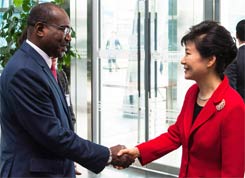
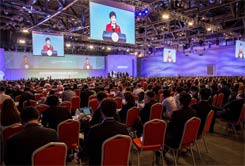
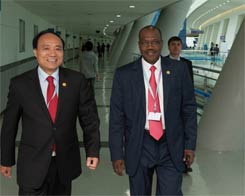
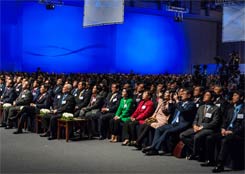

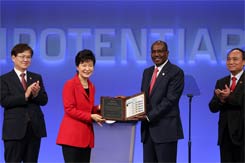
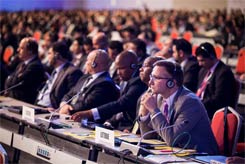
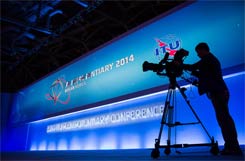
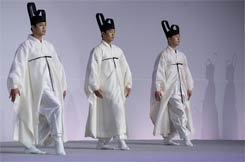
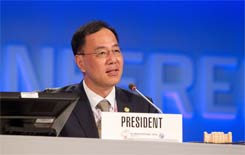
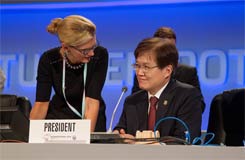
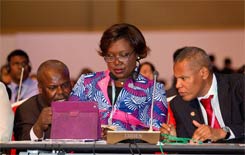
|
|
